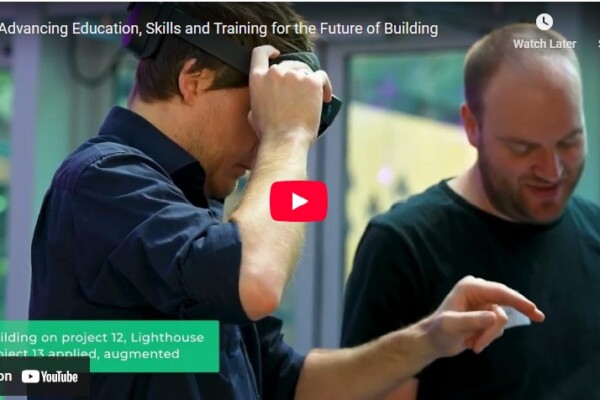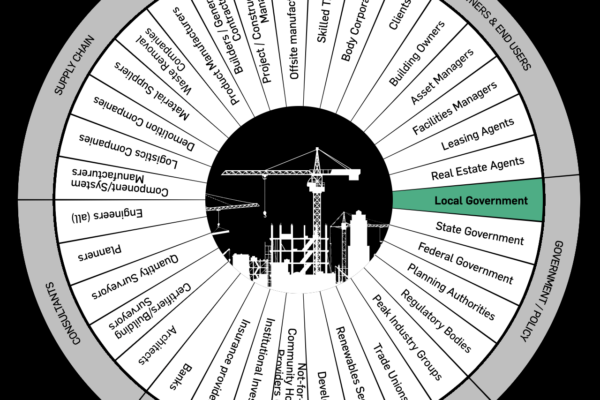Building 4.0 CRC seeks to achieve better buildings and new efficiencies through technology and collaboration.
Building 4.0 CRC leverages academic partners Monash University, The University of Melbourne, and the Queensland University of Technology’s leading expertise to establish a collaborative approach to building innovation.
Our Program Leaders possess a wealth of research knowledge covering all stages of the building process – Architecture, Design, Planning, Construction, Engineering, Business, Information Technology, and Law.
Our research is industry-led, with our experts committed to catapulting the industry into an efficient, connected and customer-centric future, with ‘real-world’ outputs and applications. Our ‘Lighthouse Projects’ will demonstrate to the wider industry the advances made in CRC projects, through real buildings that are delivered through the CRC.
Our research at a glance
-
People, Practices and Culture
-
Business Model Innovation
Business Model Innovation
This theme explores the strategic alignment, transformation leadership and management to enable total ecosystem perspective of value alignment through either platform or integrated project delivery. The value proposition within the theme provides a roadmap and evaluation canvas to transform into a very competitive value (supply/demand) network (and value receiver/contributor) and collaboration that leads to a cultural shift for a sustainable competitive advantage.
Theme coordinator

Robert Moehler
Projects
#70 Building Circularity 4.0: First Steps to Adoption
#80 Why are insolvencies so high in the Construction industry and what can be done about it?
#93 US Research Tour 2024: San Francisco and Greater Bay area
#95 The Homes NSW MMC Program
#112 Flexible wet cores for volumetric housing construction
-
Change Management
Change Management
This theme will bring expertise, applied research, and evidence-based practices that can facilitate change and transformation of the construction industry, its associated stakeholders, and its managers and workforce. The expertise spans areas of engineering, management, design and economics, among others, and will help with conducting collaborative projects with industry partners to develop, test and integrate innovative practices in their work.
Theme coordinator

Associate Professor Niharika Garud
Projects
#21 Regulatory Reform for Industrialised Building
#56 Accelerating B4.0CRC Translation and Impact
#95 The Homes NSW MMC Program
#102 Skills and training implications of modern methods of construction: Across design, manufacture and assembly
#111 VET Qualifications System and Training Framework for Modern Methods of Construction
-
Construction Safety and Wellbeing
Construction Safety and Wellbeing
The Safety Theme will leverage opportunities brought about by new construction practices and technology interruptions to improve construction safety and change the way safety is handled in the whole project lifecycle, making construction a safer and healthier work environment.
Theme coordinator

Dr Carol Hon
Projects
#29 Real-time EH&S Intervention to Improve Site Safety (Scoping Study)
#60 Mass Timber Wellness in Workplaces
#102 Skills and training implications of modern methods of construction: Across design, manufacture and assembly
#111 VET Qualifications System and Training Framework for Modern Methods of Construction
Light House Project #13: Mixed Reality Carpentry Demonstration
-
Contracts and Procurement
Contracts and Procurement
This theme covers all matters relating to the procurement of building projects with a particular focus on commercial arrangements and leveraging opportunities from digital developments. Issues of interest stem from all phases of the project lifecycle, from planning, feasibility and risk allocation, tender processes and negotiation, through to project management, performance and delivery.
Theme coordinator

Ilsa Kuiper
-
Culture and Diversity
Culture and Diversity
The traditional construction industry is highly fragmented and competitive, but not efficient. It is also marked by profound gender and diversity imbalance. Shifting the industry to support greater collaboration and innovation involves shifting the culture attending to gender and other diversity at all levels. All prospective projects need to consider their culture and diversity implications.
Theme coordinator

Dr Gillian Matthewson
-
Customers and Markets
Customers and Markets
This theme has the expertise, experience and capacity to inquire into consumer technology adoption of emerging technologies and consumer information processing, to model and optimise consumer user experience and customer centric business models, and to develop analytical and collaborative tools to enable customer centric transformation.
Theme coordinator

Dr Zahra Seyedghorban
-
Finance and Economics
Finance and Economics
Finance and Property Development Economics is a multi-disciplinary theme including the core expertise and experience in finance and economics, but also in property development, valuation and customers’ preferences. This theme can contribute to feasibility estimations and viability studies of property development or community development projects. Market and customer analyses, finance, profit and return estimations, and cost calculations are part of feasibility studies.
Projects
#55 Towards smart contracts and smart finance in construction – Phase 1
#60 Mass Timber Wellness in Workplaces
#80 Why are insolvencies so high in the Construction industry and what can be done about it?
#95 The Homes NSW MMC Program
#97 Self Storage Association of Australasia Digital Platform Development
-
Future of Work & Industrial Relations
Future of Work & Industrial Relations
Projects
#49 Implications of Industry 4.0 technologies on work practices
#66 Future of construction education
#102 Skills and training implications of modern methods of construction: Across design, manufacture and assembly
#111 VET Qualifications System and Training Framework for Modern Methods of Construction
-
Policy and Regulation
Policy and Regulation
Building 4.0 CRC has a common policy and regulatory thread – ‘More Effective Governance, Policy and Regulation in the Building Industry’. The Policy & Regulatory Theme provides the expertise, experience and capabilities to develop conducive policy, governance and regulatory settings to support the CRC’s broad vision and specific projects.
Theme coordinator

Dr Eric Windholz
Projects
#21 Regulatory Reform for Industrialised Building
#33 Evaluation of emerging technologies for remote inspections of building work
#55 Towards smart contracts and smart finance in construction – Phase 1
#80 Why are insolvencies so high in the Construction industry and what can be done about it?
#95 The Homes NSW MMC Program
-
Property Development
-
Risk Management
Risk Management
This theme will provide Building 4.0 CRC with surety in achieving objectives and maximising the value via a proactive, systematic, and holistic process.
Theme coordinator

Ming Xu
-
Supply Chain Management, Logistics
Supply Chain Management, Logistics
Transforming the building sector aims to address the challenges faced by the global and complex supply chain through increasing the transparency and visibility of the operations, enhancing the traceability and reliability of the supplied materials, and optimising the effectiveness and efficiency of the logistics systems. This theme draws cross-disciplinary experts from business and operation management, manufacturing, and transportation, to procurement and contract, and information technology, in order to provide a holistic view of the entire system.
Theme coordinator

Dr Wen Li
People, Practices and Culture
Projects
#21 Regulatory Reform for Industrialised Building
#29 Real-time EH&S Intervention to Improve Site Safety (Scoping Study)
#33 Evaluation of emerging technologies for remote inspections of building work
#49 Implications of Industry 4.0 technologies on work practices
#55 Towards smart contracts and smart finance in construction – Phase 1
#56 Accelerating B4.0CRC Translation and Impact
#60 Mass Timber Wellness in Workplaces
#61 Building Productivity – Product, Process, People
#65 European Research Tour 2023: Berlin – Copenhagen – Malmö
#66 Future of construction education
#70 Building Circularity 4.0: First Steps to Adoption
#80 Why are insolvencies so high in the Construction industry and what can be done about it?
#93 US Research Tour 2024: San Francisco and Greater Bay area
#95 The Homes NSW MMC Program
#97 Self Storage Association of Australasia Digital Platform Development
#102 Skills and training implications of modern methods of construction: Across design, manufacture and assembly
#111 VET Qualifications System and Training Framework for Modern Methods of Construction
#112 Flexible wet cores for volumetric housing construction
Light House Project #3: NCHA Independent Living Lab
Light House Project #6: Malvern East Apartment Development
Light House Project #13: Mixed Reality Carpentry Demonstration
Partners
Monash University (28)
Master Builders Association Victoria (20)
Holmesglen Institute (18)
Victorian Building Authority (17)
The University of Melbourne (16)
Queensland University of Technology (15)
Sumitomo Forestry Australia (10)
Lendlease Digital (8)
Fleetwood Australia (7)
Homes NSW (6)
A.G. Coombs (6)
PT Blink (5)
BuildSkills Australia (4)
Standards Australia (2)
VIRIDI Group (2)
Nexans (2)
Cruxes Innovation (1)
BlueScope (1)
Ynomia (1)
Self Storage Association of Australasia (1)
Salesforce.com, Inc. (1)
-
Business Model Innovation
-
Sustainability
- Circular Economy
-
Energy
Energy
The energy theme explores energy use and generation technologies in construction practices and products towards meeting carbon neutrality goals in buildings and organisations.
Theme coordinator

Dr Victor Bunster
Projects
#50 Development of Artificial Neural Network and Automated Life Cycle Assessments for Cloud Based Residential Energy Estimations
#58 The Retrofit Housing Atlas
#76 Thermally active floor panels for cost effective space cooling
#105 Blockchain-powered peer-to-peer energy trading: Advancing sustainability and affordability in smart residential communities
#108 Project Circle Design Phase 1
-
Environmentally Sustainable Design
Environmentally Sustainable Design
The environmentally sustainable design (ESD) theme focuses on defining design solutions to minimise the environmental impacts of buildings before, during, and after occupancy.
Theme coordinator

Dr Victor Bunster
-
Indoor Environmental Quality
Indoor Environmental Quality
This theme aims to protect all building occupants and maintain healthy indoor environments. It is interdisciplinary, incorporating perspectives from building physics; engineering principles from environmental, chemical and mechanical domain; and management components. The scope of This theme covers a range of emerging topics in urban environments, such as developing energy efficient pathways to healthy buildings, improving resilience of buildings to extreme weather events, and assessing the cost benefit of green building technologies, to name a few.
Theme coordinator

Dr Jenny Zhou
Projects
#58 The Retrofit Housing Atlas
#76 Thermally active floor panels for cost effective space cooling
#100 IEQ Monitoring of Aboriginal Housing Office 3D Printed Houses
Light House Project #1: Monash Smart Manufacturing Hub (mSMH) – A Digital Twin Living Lab
Light House Project #6: Malvern East Apartment Development
-
Life Cycle Assessment
Life Cycle Assessment
The life cycle assessment (LCA) theme looks at strategies and methods to quantify and minimise the environmental impacts of buildings, from the extraction of raw materials until their end-of-life stage.
Theme coordinator

Dr Victor Bunster
Projects
#28 Componentised Internal Wall Systems for Multi-residential Applications
#50 Development of Artificial Neural Network and Automated Life Cycle Assessments for Cloud Based Residential Energy Estimations
#59 Innovative Steel–Timber–Concrete Composite StrongFloor
#65 European Research Tour 2023: Berlin – Copenhagen – Malmö
Light House Project #6: Malvern East Apartment Development
-
Sustainable Materials & Products
Sustainable Materials & Products
This theme will further the structural, thermal and construction performance of a range of sustainable materials, in turn providing less carbon-intensive solutions for buildings.
Theme coordinator

Dr Philip Christopher
Projects
#58 The Retrofit Housing Atlas
#70 Building Circularity 4.0: First Steps to Adoption
#76 Thermally active floor panels for cost effective space cooling
#104 Development of a solution for high-rise mass timber residences through a Post & Plate system – Phase 2 Numerical and experimental investigation
#108 Project Circle Design Phase 1
-
Waste Reduction
Waste Reduction
Projects
#15 Using the Whole Tree for Future Timber-Based Construction – Scoping Study
#37 Australian Timber Fibre Insulation Scoping Study
#70 Building Circularity 4.0: First Steps to Adoption
#84 Feasibility study of recycling excavated clay materials in full-scale concrete applications
#86 Sustainable 3D printed concrete for bespoke infrastructure
Sustainability
Projects
#15 Using the Whole Tree for Future Timber-Based Construction – Scoping Study
#28 Componentised Internal Wall Systems for Multi-residential Applications
#37 Australian Timber Fibre Insulation Scoping Study
#48 Scoping Study for Building the Future – Circular Economy – Shared Interest Project
#50 Development of Artificial Neural Network and Automated Life Cycle Assessments for Cloud Based Residential Energy Estimations
#58 The Retrofit Housing Atlas
#59 Innovative Steel–Timber–Concrete Composite StrongFloor
#65 European Research Tour 2023: Berlin – Copenhagen – Malmö
#70 Building Circularity 4.0: First Steps to Adoption
#76 Thermally active floor panels for cost effective space cooling
#84 Feasibility study of recycling excavated clay materials in full-scale concrete applications
#86 Sustainable 3D printed concrete for bespoke infrastructure
#100 IEQ Monitoring of Aboriginal Housing Office 3D Printed Houses
#104 Development of a solution for high-rise mass timber residences through a Post & Plate system – Phase 2 Numerical and experimental investigation
#105 Blockchain-powered peer-to-peer energy trading: Advancing sustainability and affordability in smart residential communities
#108 Project Circle Design Phase 1
#112 Flexible wet cores for volumetric housing construction
Light House Project #1: Monash Smart Manufacturing Hub (mSMH) – A Digital Twin Living Lab
Light House Project #6: Malvern East Apartment Development
Partners
The University of Melbourne (18)
Monash University (13)
Sumitomo Forestry Australia (9)
Hyne & Son (8)
Fleetwood Australia (6)
A.G. Coombs (5)
Donovan Group (5)
Holmesglen Institute (5)
Master Builders Association Victoria (5)
Victorian Building Authority (5)
Queensland University of Technology (4)
Standards Australia (4)
Green Building Council of Australia (4)
uTecture Australia (3)
Taphcore® (3)
Lendlease Digital (2)
VIRIDI Group (2)
NSW Aboriginal Housing Office (2)
Blue IoT (2)
BlueScope (1)
Verton (1)
Ynomia (1)
Populous (1)
Stockland (1)
Web3in Tech-Lab (1)
Amazon Web Services (1)
Cedar Pacific (1)
Ultimate Windows (1)
M80 Ring Road Completion (1)
Spark – North East Link (1)
Everhard Industries (1)
-
Digitalisation
-
Artificial Intelligence and Machine Learning
Artificial Intelligence and Machine Learning
This theme focuses on the automation and improvement of decision-making in the building industry, such that it is safe, robust, and cost and resource efficient.
Theme coordinator

Dr Buser Say
Projects
#50 Development of Artificial Neural Network and Automated Life Cycle Assessments for Cloud Based Residential Energy Estimations
#53 Process Engineering, and Design and Estimating Automation of Fleetwood’s Product Platform
#85 From Digital Design to Human Robot Collaborative Masonry Construction
#90 Evaluating the effectiveness of roofing work inspection using remotely piloted aircraft systems
Light House Project #28: The application of computer vision to measure productivity and enhance safety on construction sites
-
Building Operation and Performance
Building Operation and Performance
This theme focuses on the performance of building after construction. The performance can be defined based on a range of criteria, from environmental and energy aspects to reliability and occupant satisfaction. To meet the performance objectives, these criteria need to be considered from the early design stages.
Theme coordinator

Dr Sara Omrani
Projects
#55 Towards smart contracts and smart finance in construction – Phase 1
#58 The Retrofit Housing Atlas
#76 Thermally active floor panels for cost effective space cooling
#100 IEQ Monitoring of Aboriginal Housing Office 3D Printed Houses
#105 Blockchain-powered peer-to-peer energy trading: Advancing sustainability and affordability in smart residential communities
-
Computational Design
Computational Design
This theme aims to automate traditional building design processes by rapidly generating and optimising numerous designs early in the conceptual phase through computational techniques.
Theme coordinator

Dr Abdallah Ghazlan
Projects
#32 Acoustic flanking performance of mid-rise light gauge steel (LGS) structures
#53 Process Engineering, and Design and Estimating Automation of Fleetwood’s Product Platform
#71 Automated decision making for interdisciplinary coordination during early-stage building design
#95 The Homes NSW MMC Program
#112 Flexible wet cores for volumetric housing construction
-
Cybersecurity
Cybersecurity
This theme will enhance home automation and security systems for the Building 4.0 CRC platform, including ensuring data privacy, revealing security vulnerabilities, and identifying potential threats.
Theme coordinator

Dr Sarah Erfani
-
Digital and Automated Fabrication (Robotics)
Digital and Automated Fabrication (Robotics)
This theme will put particular emphasis on Digital & Automated Fabrication, Artificial Intelligence & Machine Learning, Computational Design, Optimisation, as well as Modelling & Simulation, where novel robotic systems can boost the efficiency and reduce the time and cost for infrastructure construction, daily operation and maintenance.
Theme coordinator

Dr Chao Chen
Projects
#17 The implication of Industry 4.0 for the construction industry: towards smart prefab
#28 Componentised Internal Wall Systems for Multi-residential Applications
#86 Sustainable 3D printed concrete for bespoke infrastructure
#100 IEQ Monitoring of Aboriginal Housing Office 3D Printed Houses
Light House Project #13: Mixed Reality Carpentry Demonstration
-
Digital Project Management
Digital Project Management
This theme’s research focuses on embracing computer-integrated technologies in design and construction project management. It will also focus on the design and development of VR/AR/MR, and Serious Game applications for workforce capacity development towards optimisation of coordination, progress monitoring, and building assembly at the construction site.
Projects
#17 The implication of Industry 4.0 for the construction industry: towards smart prefab
#55 Towards smart contracts and smart finance in construction – Phase 1
#61 Building Productivity – Product, Process, People
#93 US Research Tour 2024: San Francisco and Greater Bay area
Light House Project #28: The application of computer vision to measure productivity and enhance safety on construction sites
-
Digital Twins & 3D Modelling
Digital Twins & 3D Modelling
Digitising Physical Assets concerns the development of methodologies and technologies for efficient mapping and 3D as-built modelling of buildings and construction sites. The Theme involves researchers from the three universities as well as industry partners participating in the CRC, who offer collective expertise in various areas related to digitisation, 3D modelling, and visualisation of physical assets.
Theme coordinator

Dr Kourosh Khoshelham
Projects
#29 Real-time EH&S Intervention to Improve Site Safety (Scoping Study)
#90 Evaluating the effectiveness of roofing work inspection using remotely piloted aircraft systems
#112 Flexible wet cores for volumetric housing construction
Light House Project #1: Monash Smart Manufacturing Hub (mSMH) – A Digital Twin Living Lab
Light House Project #13: Mixed Reality Carpentry Demonstration
-
ePlanning and eApprovals
ePlanning and eApprovals
The longer-term objective of This theme is to integrate existing planning, regulation and policy into a platform to facilitate and speed up automatic checking, compliance testing, and approval. State and local government, developers, architects, building surveyors and builders will use this technology to check approval and certification.
Theme coordinator

Dr Davood Shojaei
-
IoT, Sensors and Construction Tech
IoT, Sensors and Construction Tech
The Internet of Things (IoT) is a network of sensors, smart devices and computational resources connected via the Internet for monitoring, controlling and actuating processes in real-time. IoT sensors form the core interconnecting backbone between our physical world (sensors) and the digital world (“digital twin”) in the construction industry.
Theme coordinator

Dr Aravinda Rao
Projects
#29 Real-time EH&S Intervention to Improve Site Safety (Scoping Study)
#55 Towards smart contracts and smart finance in construction – Phase 1
#85 From Digital Design to Human Robot Collaborative Masonry Construction
Light House Project #1: Monash Smart Manufacturing Hub (mSMH) – A Digital Twin Living Lab
Light House Project #28: The application of computer vision to measure productivity and enhance safety on construction sites
-
Platforms and Process
Platforms and Process
This theme provides a foundation for the development of a fundamentally new approach to building that is based on a platform approach to: product development; stakeholder co-ordination; continual improvement; and the processes required to achieve this future. Platform-based opportunities lie in: the articulation of product platforms for construction; the use of platform-based approaches to new sections of industry, such as construction logistics; the development of integrated value-chain software platforms; and the possibilities of platform-based business ecosystems as an alternative to construction’s traditional project structures.
Theme coordinator

Dr Duncan Maxwell
Projects
#53 Process Engineering, and Design and Estimating Automation of Fleetwood’s Product Platform
#90 Evaluating the effectiveness of roofing work inspection using remotely piloted aircraft systems
#93 US Research Tour 2024: San Francisco and Greater Bay area
#95 The Homes NSW MMC Program
#112 Flexible wet cores for volumetric housing construction
-
User Interface, Visualisation and Analytics
User Interface, Visualisation and Analytics
This theme will leverage the most recent and capable technologies to support human activity at the centre of activities during all stages of the building lifecycle. This includes the design and invention of effective human interfaces, intuitive data visualisations, and interactive human-in-the-loop analysis tools.
Theme coordinator

Dr Barrett Ens
Projects
#55 Towards smart contracts and smart finance in construction – Phase 1
#90 Evaluating the effectiveness of roofing work inspection using remotely piloted aircraft systems
#97 Self Storage Association of Australasia Digital Platform Development
#112 Flexible wet cores for volumetric housing construction
Light House Project #13: Mixed Reality Carpentry Demonstration
Digitalisation
Program leader

Assoc. Prof. Duncan Maxwell
Projects
#1 ePlanning and eApprovals – Scoping Study
#17 The implication of Industry 4.0 for the construction industry: towards smart prefab
#28 Componentised Internal Wall Systems for Multi-residential Applications
#29 Real-time EH&S Intervention to Improve Site Safety (Scoping Study)
#32 Acoustic flanking performance of mid-rise light gauge steel (LGS) structures
#50 Development of Artificial Neural Network and Automated Life Cycle Assessments for Cloud Based Residential Energy Estimations
#53 Process Engineering, and Design and Estimating Automation of Fleetwood’s Product Platform
#55 Towards smart contracts and smart finance in construction – Phase 1
#58 The Retrofit Housing Atlas
#61 Building Productivity – Product, Process, People
#71 Automated decision making for interdisciplinary coordination during early-stage building design
#76 Thermally active floor panels for cost effective space cooling
#85 From Digital Design to Human Robot Collaborative Masonry Construction
#86 Sustainable 3D printed concrete for bespoke infrastructure
#90 Evaluating the effectiveness of roofing work inspection using remotely piloted aircraft systems
#93 US Research Tour 2024: San Francisco and Greater Bay area
#95 The Homes NSW MMC Program
#97 Self Storage Association of Australasia Digital Platform Development
#100 IEQ Monitoring of Aboriginal Housing Office 3D Printed Houses
#105 Blockchain-powered peer-to-peer energy trading: Advancing sustainability and affordability in smart residential communities
#112 Flexible wet cores for volumetric housing construction
Light House Project #1: Monash Smart Manufacturing Hub (mSMH) – A Digital Twin Living Lab
Light House Project #13: Mixed Reality Carpentry Demonstration
Light House Project #28: The application of computer vision to measure productivity and enhance safety on construction sites
Partners
Monash University (31)
The University of Melbourne (21)
Queensland University of Technology (13)
Holmesglen Institute (13)
Victorian Building Authority (11)
Master Builders Association Victoria (11)
Fleetwood Australia (8)
Sumitomo Forestry Australia (6)
Lendlease Digital (6)
PT Blink (5)
Level Crossing Removal Project (3)
Sightdata (3)
A.G. Coombs (3)
Ynomia (3)
uTecture Australia (2)
Brickworks (2)
NSW Aboriginal Housing Office (2)
Blue IoT (2)
Web3in Tech-Lab (2)
Homes NSW (2)
AMGC Advanced Manufacturing Growth Centre (2)
Amazon Web Services (2)
Donovan Group (1)
Hyne & Son (1)
Standards Australia (1)
Green Building Council of Australia (1)
Taphcore® (1)
BlueScope (1)
NASH National Association of Steel Framed Housing (1)
Everhard Industries (1)
Salesforce.com, Inc. (1)
Self Storage Association of Australasia (1)
-
Artificial Intelligence and Machine Learning
-
Industrialisation
-
Building Design and DFMA
Building Design and DFMA
Design for Manufacture and Assembly (DfMA) is a concept that was developed in the manufacturing industries to address production problems through product design, enabling manufacturing cost and speed improvements. The Building Design and DfMA theme is aimed at identifying the ways in which design can contribute to more efficient production of buildings (faster, easier, cheaper, less wasteful) and ultimately, better designed outcomes.
Projects
#61 Building Productivity – Product, Process, People
#71 Automated decision making for interdisciplinary coordination during early-stage building design
#95 The Homes NSW MMC Program
#112 Flexible wet cores for volumetric housing construction
Light House Project #13: Mixed Reality Carpentry Demonstration
-
Building Materials & Systems
Building Materials & Systems
This theme underpins building innovations. It introduces high-performance materials and systems that solve industry problems cost-efficiently, with no compromise to end-user wellbeing.
Theme coordinator

Dr Rackel San Nicolas
Projects
#58 The Retrofit Housing Atlas
#76 Thermally active floor panels for cost effective space cooling
#84 Feasibility study of recycling excavated clay materials in full-scale concrete applications
#104 Development of a solution for high-rise mass timber residences through a Post & Plate system – Phase 2 Numerical and experimental investigation
#105 Blockchain-powered peer-to-peer energy trading: Advancing sustainability and affordability in smart residential communities
-
Connected Construction Sites
Connected Construction Sites
Construction sites are by nature unstructured and dynamic environments; the complex interaction between structures, materials, equipment, and workers is not often effectively monitored and managed. This theme aims to develop and validate state-of-the-art technologies and processes to connect construction resources to facilitate real-time and precise monitoring, control and optimisation of construction projects.
Theme coordinator

Dr Yihai Fang
-
Construction Management
Construction Management
This theme is a key enabler for the future, integrating smart processes and real-time data collection and analysis. The construction research is focused on optimising project performance measures such as delivery time, cost and quality.
Theme coordinator

Dr Mehrdad Arashpour
Projects
#21 Regulatory Reform for Industrialised Building
#61 Building Productivity – Product, Process, People
#68 Development of a solution for high-rise mass timber residences through a Post & Plate system – Phase 1 feasibility study
#104 Development of a solution for high-rise mass timber residences through a Post & Plate system – Phase 2 Numerical and experimental investigation
Light House Project #13: Mixed Reality Carpentry Demonstration
-
Fire Safety
Fire Safety
This theme explores the relationship between fire-safe buildings and industrialised construction. It focuses on understanding the fire performance of building compartments and facade systems by assessing their flammability and associated fire spread hazards. It also studies novel material products used for construction, such as engineered timber and bamboo.
Projects
#18 Long-span Low-Carbon Floor Systems (Scoping Study)
#24 Next Generation of Robust and Fire-resilient Light Gauge Steel Systems for Mid-Rise Buildings (Umbrella Project)
#35 Prefab Housing Solutions for Bushfire & Disaster Relief
#76 Thermally active floor panels for cost effective space cooling
-
Housing and Urban Design (Affordability)
Housing and Urban Design (Affordability)
The design research expertise offered by the Housing and Urban Design theme provides a vehicle for generating and testing innovative approaches to housing design, delivery and assessment that operate across the scales of building componentry, dwelling typology, site assembly, development precincts and urban systems. The collaborative and multi-scalar nature of design research has the capacity to synthesise complex stakeholder inputs into site-specific and applied project outcomes, supporting the CRC’s aims to affect the whole value chain by integrating digital, sectoral and building transformations.
Theme coordinator

Dr Lee-Anne Khor
Projects
#32 Acoustic flanking performance of mid-rise light gauge steel (LGS) structures
#35 Prefab Housing Solutions for Bushfire & Disaster Relief
#93 US Research Tour 2024: San Francisco and Greater Bay area
#95 The Homes NSW MMC Program
#112 Flexible wet cores for volumetric housing construction
-
Planning, Uses and Zoning
Planning, Uses and Zoning
The planning system is highly entwined into the building procurement process, interceding multiple times throughout the course of delivering a project. The uncertainty the planning systems introduces to timing, through delays in obtaining approvals and community objections, are considered a significant risk in building construction and a barrier to efficient development processes. Concurrent with these criticisms, the relative clarity and certainty of receiving planning approval in Australia’s capital cities is noted to be a competitive advantage when attracting overseas developers to build and invest in Australia. Clarity and certainty within Australia’s planning systems are therefore critical elements of the building procurement process and the building industry’s future development. For Australia to successful move towards a Building 4.0 industry and improve building phases, it is important to address the potentials for advancements and barriers to efficiencies that exist within Australia’s planning systems.
Theme coordinator

Alexa Gower
-
Prefabrication & Advanced Manufacturing
Prefabrication & Advanced Manufacturing
Projects
#58 The Retrofit Housing Atlas
#84 Feasibility study of recycling excavated clay materials in full-scale concrete applications
#93 US Research Tour 2024: San Francisco and Greater Bay area
#95 The Homes NSW MMC Program
#104 Development of a solution for high-rise mass timber residences through a Post & Plate system – Phase 2 Numerical and experimental investigation
- Product & Process Efficiency
-
Structural Optimisation
Structural Optimisation
With a combined expertise in structural modelling and computational mechanics, our Structural Optimisation Theme has the capacity to develop and optimise structural systems for building, bridge and other infrastructure applications.
Theme coordinator

Dr Tai Thai
Projects
#20 Systems and methods for robustness of mid-rise light gauge steel (LGS) buildings – Phase 1 Scoping Study
#24 Next Generation of Robust and Fire-resilient Light Gauge Steel Systems for Mid-Rise Buildings (Umbrella Project)
#59 Innovative Steel–Timber–Concrete Composite StrongFloor
#71 Automated decision making for interdisciplinary coordination during early-stage building design
-
Urban Infrastructure
Urban Infrastructure
Industrialisation
Program leader

Prof. Tuan Ngo
Projects
#1 ePlanning and eApprovals – Scoping Study
#18 Long-span Low-Carbon Floor Systems (Scoping Study)
#20 Systems and methods for robustness of mid-rise light gauge steel (LGS) buildings – Phase 1 Scoping Study
#21 Regulatory Reform for Industrialised Building
#24 Next Generation of Robust and Fire-resilient Light Gauge Steel Systems for Mid-Rise Buildings (Umbrella Project)
#32 Acoustic flanking performance of mid-rise light gauge steel (LGS) structures
#35 Prefab Housing Solutions for Bushfire & Disaster Relief
#58 The Retrofit Housing Atlas
#59 Innovative Steel–Timber–Concrete Composite StrongFloor
#61 Building Productivity – Product, Process, People
#68 Development of a solution for high-rise mass timber residences through a Post & Plate system – Phase 1 feasibility study
#71 Automated decision making for interdisciplinary coordination during early-stage building design
#76 Thermally active floor panels for cost effective space cooling
#84 Feasibility study of recycling excavated clay materials in full-scale concrete applications
#93 US Research Tour 2024: San Francisco and Greater Bay area
#95 The Homes NSW MMC Program
#97 Self Storage Association of Australasia Digital Platform Development
#104 Development of a solution for high-rise mass timber residences through a Post & Plate system – Phase 2 Numerical and experimental investigation
#105 Blockchain-powered peer-to-peer energy trading: Advancing sustainability and affordability in smart residential communities
#112 Flexible wet cores for volumetric housing construction
Light House Project #6: Malvern East Apartment Development
Light House Project #13: Mixed Reality Carpentry Demonstration
Partners
Monash University (22)
The University of Melbourne (22)
Sumitomo Forestry Australia (10)
Lendlease Digital (8)
A.G. Coombs (6)
Hyne & Son (6)
Queensland University of Technology (6)
Fleetwood Australia (5)
Holmesglen Institute (4)
Master Builders Association Victoria (4)
Victorian Building Authority (4)
BlueScope (4)
Homes NSW (3)
Standards Australia (3)
Cedar Pacific (3)
NASH National Association of Steel Framed Housing (3)
Ynomia (2)
Donovan Group (2)
Green Building Council of Australia (2)
Taphcore® (2)
M80 Ring Road Completion (2)
Spark – North East Link (2)
AMGC Advanced Manufacturing Growth Centre (2)
VIRIDI Group (2)
Web3in Tech-Lab (1)
uTecture Australia (1)
Salesforce.com, Inc. (1)
Self Storage Association of Australasia (1)
-
Building Design and DFMA
Projects
If you’re interested in partnering with us on one of our projects, please email us at info@building40crc.org.
Resources

Project #3: Projects to Platforms Scoping Study – Final report for public
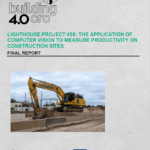
Lighthouse Project #28: The application of computer vision to measure productivity on construction sites
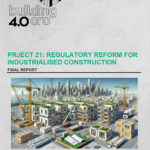
Project #21: Regulatory reform for industrialised construction
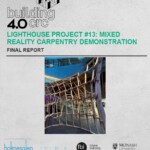
Lighthouse Project #13: Mixed Reality Carpentry Demonstration – Final Report
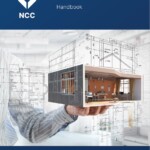
Project #103: ABCB Prefabricated, modular and offsite construction – Handbook
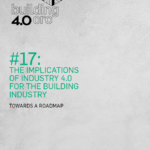
Project #17: The implications of Industry 4.0 for the building industry

